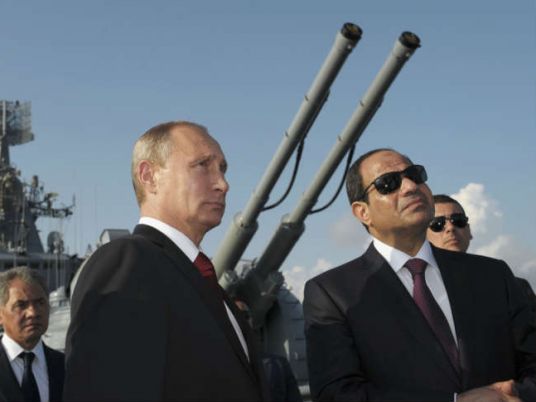
Russian President Vladimir Putin visits Egypt on Monday as Moscow looks to expand its reach in the Arab world's most populous country at a time when Cairo-Washington ties remain frayed.
His two-day trip will be Putin's first in a decade to Egypt and comes after a 2011 popular uprising that ousted ex-strongman Hosni Mubarak, who the Russian leader met in his previous visit in 2005.
Putin is a key non-Arab backer of President Abdel Fattah al-Sisi, who faces harsh criticism from Washington for his deadly crackdown on dissent since Islamist leader Mohamed Morsi was ousted by the then army chief in July 2013.
Hundreds of Morsi's supporters have been killed and thousands imprisoned in a crackdown since his ouster.
Experts say Putin's visit is also aimed at showing that he is not isolated internationally despite the crisis in Ukraine.
Officials say Putin's trip is intended to strengthen ties between the two countries.
"The leaders will pay special attention to ramping up trade and economic ties between the two countries," the Kremlin said ahead of the visit.
Putin and Sisi are also expected to discuss Iraq, Syria and Libya and the Israeli-Palestinian conflict.
Commercial agreements are also on the agenda, including a likely deal between Russian news agency Rossiya Segodnya and Egypt's state-owned Al-Ahram newspaper, which on Sunday ran a full-page article headlined "Putin — hero of this era".
Russia had hosted Sisi's predecessor Morsi during his one-year presidency despite banning the Islamist's Muslim Brotherhood as a "terrorist group" in 2003.
But Russia was also one of the first countries to endorse Sisi's presidential bid last year.
Russian weapons
Sisi himself visited Russia soon after ousting Morsi as a defence minister amid deteriorating relations with Washington, and followed it up with another trip in August 2014 as president.
At their meeting last summer at Putin's summer residence in Sochi, the two discussed Russia supplying weapons to Egypt, which is fighting an insurgency on the Sinai Peninsula that has killed scores of policemen and soldiers.
Moscow has aimed to grab a larger slice of the Egyptian arms market after Washington suspended some weapons deliveries in the immediate aftermath of Sisi's crackdown on Morsi supporters.
Cairo also hosted the Russian defence and foreign ministers in November — the first such visit since the Soviet era — for discussions on an Egyptian arms purchase plan.
At the time, Russian media said the two sides were close to signing a $3-billion (then 2.2 billion euros) deal for Moscow to supply missiles and warplanes including MiG-29 fighters and attack helicopters.
However in recent months Washington has warmed to Cairo again and resumed its annual $1.5 billion in aid to Egypt, also delivering Apache helicopter gunships to fight jihadists in Sinai.
Ties between Egypt and the United States still remain far from what they were before Morsi's ouster, with Washington criticising Sisi's regime for repressing Islamist as well as secular dissent.
"Putin continues to take advantage of ambiguity and contradictions in Western policies toward the Middle East," said Anna Borshchevskaya of The Washington Institute For Near East Policy.
As long as Washington criticises "Egypt's democratic backslide… it keeps open the door for Putin… to gain influence in Egypt at the expense of US interests," said the expert on Moscow's policy towards the Middle East.




